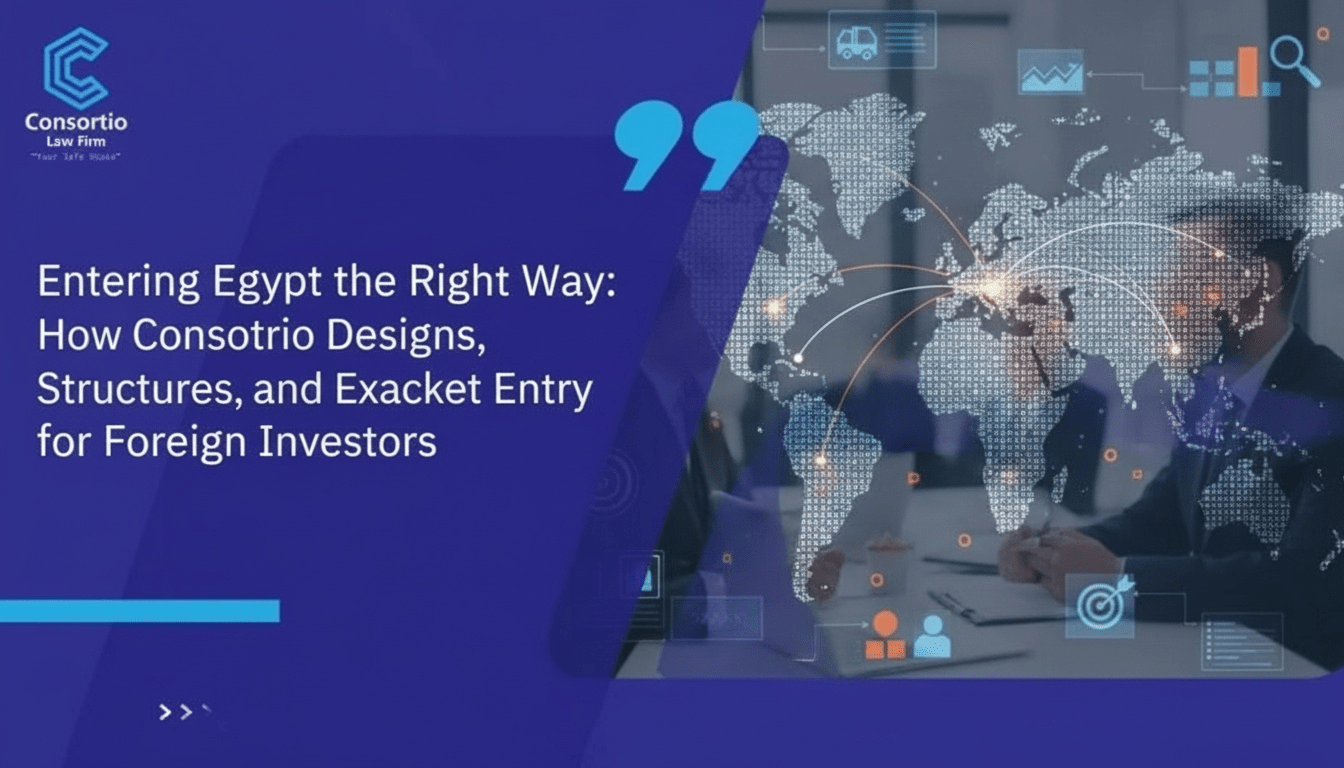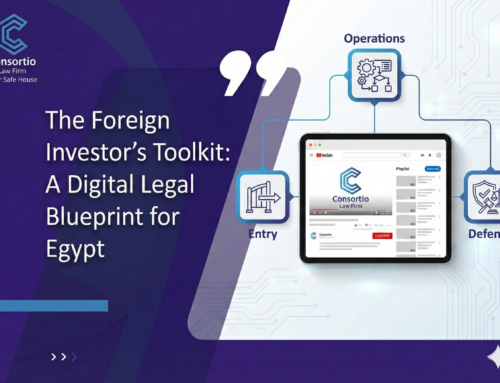Egypt is one of the most strategically important destinations for international companies expanding into the Middle East and Africa. With its population size, geographic positioning, emerging industries, and expanding infrastructure, the Egyptian market offers immense potential for companies in technology, manufacturing, engineering, consulting, logistics, food industries, FMCG, energy, and countless other sectors.
But entering Egypt correctly — in a way that is compliant, efficient, risk-free, and aligned with business goals — requires much more than filing incorporation documents.
It requires engineering.
At Consortio Law Firm, we do not sell “company formation services.”
We design, structure, and execute market entry strategies that ensure long-term stability, regulatory alignment, and operational success for foreign investors.
This flagship guide walks foreign companies through the real process of entering Egypt the right way — and explains what makes Consortio’s methodology fundamentally different from anything else in the Egyptian legal market.
1. Egypt Is Not a Plug-and-Play Market — It Is a Structured Environment
Many foreign companies arrive with the assumption that Egypt works like other markets they know:
-
easy company registration,
-
limited compliance requirements,
-
straightforward licensing,
-
simple tax expectations,
-
flexible corporate governance,
-
predictable banking,
-
and fast operational activation.
None of this is true.
Egypt is a structured regulatory environment where:
-
laws are layered,
-
sectors are regulated differently,
-
documentation matters,
-
filings matter,
-
compliance matters,
-
and operational sequencing matters.
Most incorporation failures in Egypt do not happen because the investor lacked capital or interest.
They happen because the formation was done:
-
with the wrong structure,
-
with the wrong activity classification,
-
with the wrong governance setup,
-
with incorrect documentation,
-
with uncontrolled risk exposure,
-
or with no post-setup compliance system.
This is precisely why Consortio’s market-entry philosophy starts long before incorporation.
We begin with strategy, not paperwork.
2. Strategy First: The Foundation of Consortio’s Entry System
Our approach begins with understanding the investor’s business model, global structure, risk appetite, regulatory environment, and operational intentions.
Before recommending any structure — LLC, branch, representative office, OPC, or JSC — we ask:
1. What is your real activity?
Not the generic version, but the technical, operational, layered version.
Because different wording triggers different licensing paths and different compliance obligations.
2. Who are your customers?
Are they Egyptian companies? Government? Regional clients? Group entities?
This determines whether you need a taxable presence, a back-office design, or export-service structuring.
3. What is the expected volume of operations?
Light? Medium? Large?
This affects governance, banking structure, and VAT activation.
4. Will your activity require regulatory approval?
Telecom, IT, energy, logistics, pharma, engineering, manufacturing — each has its own requirements.
5. How important is speed?
Some models activate faster. Others require phased sequencing.
6. Do you need human resources in Egypt?
This affects social insurance, payroll tax, labor compliance, and residency rules.
7. What is your global ownership structure?
This determines documentation, legalization, UBO classification, and banking onboarding.
8. Will you transact with Egyptian customers?
This determines VAT, withholding, tax registration, and contract alignment.
9. Are you planning to import?
This triggers customs, GOEIC regulations, and activity classification needs.
10. Will you require an office or warehouse?
This affects tax inspection readiness and compliance.
By running this diagnostic, we design a complete Market Entry Blueprint before a single document is drafted.
This is what makes Consortio different.
We engineer the market entry — we don’t simply register a company.
3. Understanding the Entry Models: What Foreign Companies Can Actually Choose in Egypt
Egypt offers several legal models, each with advantages, limitations, and very specific purposes.
The wrong selection creates long-term regulatory and operational complications.
Below is how Consortio structures the decision-making process.
A. Representative Office – For Market Research, Not Operations
A representative office is often the first step for investors who need on-ground visibility but are not ready to execute commercially.
It is used for:
-
market research
-
feasibility studies
-
partner mapping
-
early-stage exploration
-
business development visits
-
relationship building
But the law prohibits:
-
issuing invoices
-
signing commercial contracts
-
importing or exporting goods
-
generating revenue in Egypt
We guide clients to use rep offices only when their objective is exploratory, not operational.
B. Branch of a Foreign Company – Project-Based Operations
A branch is only recommended when:
-
the company has a specific contract to execute,
-
the activity is project-based,
-
and the customer (often government) requires a branch structure.
A branch is NOT suitable for:
-
multi-sector operations,
-
product distribution,
-
service export models,
-
long-term growth strategies.
A branch creates:
-
direct tax liability at parent level,
-
limited flexibility for multi-activity operations,
-
more stringent compliance requirements.
Consortio recommends it only when absolutely necessary.
C. LLC – The Ideal Vehicle for Foreign Investors
The Limited Liability Company is the most flexible, practical structure for 95% of foreign investors entering Egypt.
Why?
Because it offers:
-
100% foreign ownership
-
no minimum capital requirement
-
no need for a pre-incorporation bank account
-
simple governance
-
flexible management powers
-
broad activity scope
-
fast incorporation
-
clean compliance path
-
controlled UBO disclosure timing
-
smooth expansion capability
-
suitability for almost all sectors
It is the perfect balance between regulatory compliance and operational flexibility.
For this reason, the LLC is the backbone of our market-entry designs.
D. OPC – A Single-Owner Model for Very Specific Use Cases
The One Person Company can be useful for:
-
small back-office operations,
-
internal service centers,
-
simple structures.
But it has drawbacks:
-
requires a pre-incorporation bank account,
-
requires capital to be deposited upfront,
-
has stricter governance in some cases,
-
is less flexible than an LLC for expansion.
We only recommend OPCs for specific scenarios.
E. JSC – For Large or Regulated Operations
A Joint Stock Company is the right choice for:
-
large manufacturing
-
engineering companies with syndicate obligations
-
telecoms
-
energy projects
-
high-capital industries
-
companies requiring public governance structures
The JSC offers scale — but also comes with:
-
capital requirements,
-
statutory auditors,
-
corporate governance obligations,
-
bank capital certificate needs,
-
more complex compliance.
Consortio advises clients when the JSC model is strategically necessary.
4. Document Engineering: Getting the Paperwork Right Matters More Than Most Investors Realize
Foreign investors are often surprised by the level of documentation required in Egypt.
But the reality is simple:
In Egypt, a company can only function properly if its documentation is precise, legalized, compliant, and structured correctly from the beginning.
Consortio handles all document engineering, including:
1. Corporate documents for each foreign shareholder
-
incorporation documents
-
shareholder registers
-
articles of association
-
group structure charts
-
certificates of incumbency
2. Powers of Attorney
These must be:
-
notarized,
-
authenticated by the foreign Ministry of Foreign Affairs,
-
legalized by the Egyptian consulate.
We provide the exact wording required.
No apostille is accepted.
3. Passport copies & security clearances
4. Activity wording tailored to regulatory needs
5. Auditor acceptance forms
6. Manager appointments & powers of authority
7. Lease agreements accepted for tax inspection
Every single document has an impact on:
-
banking approval,
-
GAFI registration,
-
tax activation,
-
VAT compliance,
-
sector licensing,
-
residency and work permit readiness.
This is where most generic incorporation providers fail — but Consortio excels.
5. Bank Onboarding in Egypt: The Most Misunderstood Step in Market Entry
Many investors think bank accounts are “routine.”
In Egypt, they are a science.
Banks apply:
-
strict AML regulations,
-
strict KYC rules,
-
full UBO verification,
-
full group structure evaluation,
-
activity assessment,
-
risk profiling.
Consortio prepares clients thoroughly for banking onboarding by:
-
structuring documents for acceptance,
-
preparing bank-compliant activity descriptions,
-
ensuring clear UBO mapping,
-
managing signatory structures,
-
aligning corporate governance with banking standards.
Without this preparation, foreign companies experience:
-
account delays,
-
account freezes,
-
outright rejections.
Consortio ensures investors clear this stage smoothly.
6. Compliance as a System — Not an Afterthought
Egypt requires companies to follow strict compliance rules across:
-
Corporate filings
-
Tax and VAT
-
Social insurance
-
Labor compliance
-
Licensing
-
Documentation
-
Governance
-
Financial reporting
Consortio’s system ensures:
-
annual filings are done on time
-
tax registrations are correct
-
VAT treatment is accurate
-
intra-group service agreements are compliant
-
monthly obligations are met
-
governance structures are documented
-
UBO filings are aligned
-
residency and work permits follow correct sequences
We build compliance into the structure — not patch it retroactively.
7. Activity Classification: The Most Critical Element of Incorporation
Egypt has its own legally binding activity coding system.
Misclassification leads to:
-
licensing rejection
-
tax complications
-
banking issues
-
customs problems
-
government disputes
-
contract unenforceability
-
regulatory penalties
We classify the activity with precision, aligning it with:
-
actual operations,
-
future expansion,
-
tax efficiency,
-
regulatory requirements.
This ensures:
-
no future conflicts,
-
no restructuring costs,
-
no activity mismatch,
-
no licensing delays.
8. Our Data Room System: Transparency, Efficiency, Control
Every Consortio client receives a structured data room containing:
-
Document templates
-
Step-by-step instructions
-
Legalization guidelines
-
Timeline mapping
-
Compliance checklist
-
Task tracking
-
Updated versions of all filings
Foreign investors appreciate this because it:
-
eliminates communication gaps
-
reduces errors
-
accelerates documentation processing
-
ensures every requirement is met
-
creates permanent transparency
It is our operational backbone.
9. What Makes Consortio Different: The Consortio Signature Approach
We do not simply register companies.
We deliver a complete Market Entry System designed for foreign investors.
Our differentiators include:
1. Strategic regulatory design
We build the structure around your real activity, not around generic templates.
2. Risk-free documentation management
We handle complex cross-border legalization and engineering of documents.
3. Accurate activity classification
No wrongly worded clauses, no licensing misalignment, no tax surprises.
4. Clear governance frameworks
We prepare authority matrices, internal structures, and powers that prevent misuse and reduce risk.
5. Cross-functional compliance protection
Tax, VAT, labor, social insurance, and sector regulations — all aligned.
6. Banking expertise
We prepare clients for strict Egyptian KYC requirements.
7. Full operational setup
We guide clients beyond incorporation through tax activation, social insurance, hiring, and contracting.
8. Dispute readiness built into the structure
If a dispute arises, the company’s structure is already legally optimized.
9. Transparency and process control
Clients always know exactly what is happening and what comes next.
10. Foreign-investor specialization
We don’t work with random retail clients — we work with serious foreign companies entering Egypt.
This is not incorporation.
This is engineered market entry.
10. The Final Outcome: A Fully Operational, Compliant, Risk-Free Egyptian Entity
When the process is complete, the investor receives:
-
a legally incorporated entity,
-
with correct activity wording,
-
correct governance,
-
correct documentation,
-
compliant tax filings,
-
active social insurance,
-
clear authority structures,
-
functional banking,
-
ready to sign contracts,
-
ready to hire,
-
ready to invoice,
-
ready to operate.
No uncertainty.
No risk.
No hidden compliance issues.
Just a clean, structured entry into one of the most important markets in the region.
Conclusion: Egypt Rewards Companies Who Enter with Precision — And Punishes Those Who Don’t
Egypt is a high-opportunity market.
But it is also a highly structured one.
Foreign companies that approach Egypt with:
-
the wrong structure,
-
the wrong documents,
-
incorrect assumptions,
-
incomplete compliance,
-
or unclear strategies
inevitably face delays, disputes, tax exposure, operational disruption, and banking complications.
Companies that enter Egypt correctly — with engineered structure and professional guidance — thrive.
Consortio is the partner that ensures your company enters Egypt the right way.
Contact Us
To design your tailored market-entry blueprint for Egypt:
Consortio Law Firm — Your strategic partner for entering, operating, and succeeding in Egypt.

